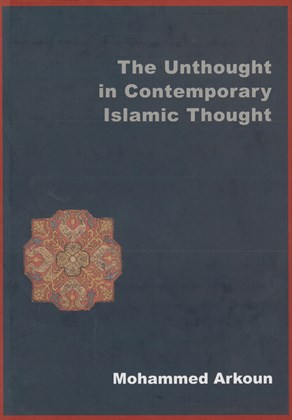The Unthought in Contemporary Islamic Thought
Saqi Books in association with the Institute of Ismaili Studies
Drawing on a combination of pertinent disciplines – history, sociology, psychology and anthropology – the author’s approach subjects every system of belief and non-belief, every tradition of exegesis, theology and jurisprudence to a critique aimed at liberating reason from the grip of dogmatic postulates.
By treating Islam as a religion as well as a time-honoured tradition of thought, Mohammed Arkoun’s work aims at overcoming the limitations of descriptive, narrative and chronological modes in history by recommending that the entire development of Islamic thought – from Quranic to modern-day fundamentalist discourses – be subjected to a critical analysis guided by these categories.
The expected outcome of such a strategy is an emancipated political reason working hand in hand with a creative imagination for a radical re-construction of mind and society in the contemporary Muslim world.
Introduction: Thinking the Unthinkable and the Unthought in Contemporary Islamic Thought
1. A Critical Introduction to Qur’ānic Studies
2. The Cognitive Status and Normative Functions of Revelation: The Example of the Qur’āan
3. Belief and the Construction of the Subject in Islamic Contexts
4. Logocentrism and Religious Truth in Islamic Thought: The Example of al-Iʿlām bi-manāqib al-Islām
5. Authority and Power in Islamic Thought
6. The Concept of Person in Islamic Tradition
7. Aspects of Religious Imaginary: The Examples of the Crusades and the Battle of Lepanto
8. The Rule of Law and Civil Society in Muslim Contexts: Beyond Dualist Thinking
Select Bibliography
Index
‘... no ordinary review could do justice to this extraordinary book ...’
– Mahmood Ibrahim, Chair of Dept. of History, California State Polytechnic University
Mohammed Arkoun is Emeritus Professor at the Sorbonne, Paris, and Director of Arabica: Journal of Arabic and Islamic Studies. He is the acclaimed author of several works on Islamic thought and Qur’ānic exegesis, including Islam, Europe and the West, and Rethinking Islam: Common Questions, Uncommon Answers.

